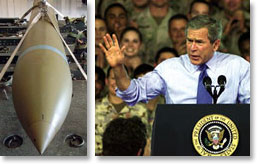JIM.LOBE
Guidance to America and the World in a Time of Trouble (FCN, 05-03-2004)

WASHINGTON (IPS/GIN) – Congress has denied funding to the Bush administration to develop new nuclear weapons designed to target “rogue states,” or terrorists believed to be developing weapons of mass destruction (WMD).
Critics who said the new “bunker buster” weapons risked blurring the lines between conventional and unconventional warfare hailed the move.
Over White House objections, members of both the House of Representatives and the Senate decided against approving $27.6 million for the Robust Nuclear Earth Penetrator (“bunker buster”) designed to destroy command-and-control facilities or WMDs buried deep underground.
The proposed funding was part of the mammoth $388 billion government spending bill which was recently approved.
Members of Congress also cut a suggested $9 million for what is called advanced-concepts research on new weapons designs, a program that could have funded new, lower-yield nuclear weapons–so-called “mini-nukes”–for use as tactical battlefield weapons.
Politicians also denied the administration $30 million it had requested to shorten the lead-time needed to resume nuclear weapons testing at the Nevada Test Site.
“This is the biggest victory that arms-control advocates in Congress have had since 1992, when we were able to place limits on nuclear testing,” said Massachusetts Rep. Edward Markey (D).
“If we are to convince other countries to forgo nuclear weapons, we cannot be preparing to build a whole new generation of nuclear weapons here in the U.S,” he added.
The decisions were also hailed by arms-control activists, who gave much of the credit for the outcome to Republican Rep. David Hobson, the chairman of the House of Representatives Appropriations Subcommittee on Energy and Water Development.
“This proves both how one person in a key position can make a major difference and that opposition to new nuclear weapons extends across party lines,” said John Isaacs, the director for the Council for a Liveable World (CLW), a grassroots organization that had lobbied against the new weapons, in a statement.
Rep. Hobson warned the administration that it “should read this as a clear signal from Congress” that any new effort to revive the funding in 2005 “would get the same reaction.”
The Bush government had made the new weapons a top priority beginning in 2002, as an integral part of its “pre-emption” strategy to be employed against terrorists and so-called rogue states suspected of having, or building, WMD.
Advocates of them have long argued that nuclear weapons, if precisely targeted and designed in a way that would limit their destructive impacts, could be used effectively for conventional purposes, particularly in Pres. Bush’s “war on terrorism.”
They also contended that such weapons would help deter attacks ordered by foreign leaders or terrorists who believed they could escape retaliation by building hardened, underground shelters.
“The problem is the public–and the Congress reflects this–just doesn’t understand the role of nuclear weapons in the post-Cold War world,” David Smith, chief operating officer of the National Institute for Public Policy (NIPP), a think tank that has long lobbied for developing more advanced nuclear weapons, told the San Francisco Chronicle.
But opponents have argued that developing new nuclear weapons could spark an arms race with other nuclear powers and make countries that have not yet crossed the nuclear threshold more determined to acquire WMD and the ability to deliver them.
In a speech last August, Rep. Hobson said he saw the administration’s proposals, particularly for the “bunker buster,” the “mini-nukes” and cutting the time needed to resume nuclear testing as “very provocative and overly aggressive policies that undermine our moral authority to argue that other nations should forgo nuclear weapons.”
“We cannot advocate for nuclear non-proliferation around the globe and pursue more useable nuclear weapons options at home,” he added.
Daryl Kimball, director of the Washington-based Arms Control Association (ACA), praised Rep. Hobson’s “enormous courage” in defying the White House. He said Congress’ action showed “that not only are Democrats convinced, but key Republicans are convinced we don’t need new nuclear weapons capabilities.”
According to CLW’s Isaacs, the politicians’ rebuff to the administration was aided by the growing concern over the unprecedented budget deficit piled up under Pres. Bush, currently more than $400 billion annually, or roughly the same amount as the defense budget.
In negotiating the omnibus spending bill, the House and Senate agreed that budgets for all executive departments, except Defense and Homeland Security, would be subject to strict ceilings for fiscal year (FY) 2005. The National Nuclear Security Administration, which runs nuclear programs, is administered by the Energy Department.
Congress also cut another administration request for $29.8 million to build plutonium pits–or nuclear triggers–for new nuclear weapons to $7 million.
“This is not winning the war by a long shot,” said California Senator Dianne Feinstein, one of the principal foes of the administration’s proposed nuclear programs. “But it is a consequential step that should send a very loud message to the administration.”












